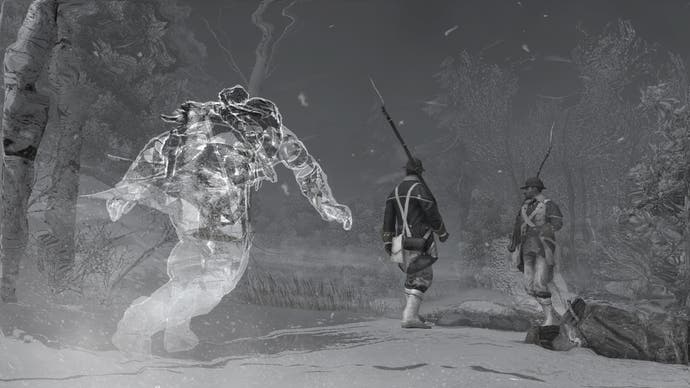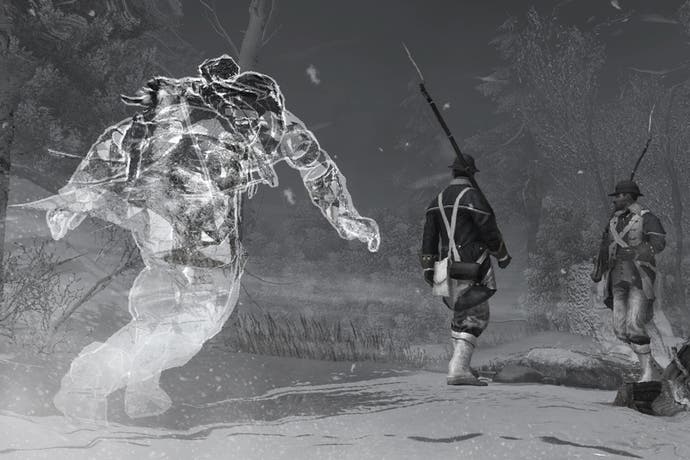Assassin's Creed 3: The Tyranny of King Washington - Episode 1 review
Unpresidented.
The Tyranny of King Washington feels like an experiment. Freed by its alternate timeline setting, this add-on campaign for Assassin's Creed 3 risks potentially game-breaking new mechanics and weaves a fantastical story punctuated by hallucinogenic interludes. Another test is Tyranny's delivery in monthly episodes, meaning you will need to part with not one but three chunks of change to play it (and Ubisoft is already trying to selling you a whole Assassin's Creed game every year!). You're likely to have questions. Thankfully, so does Assassin's Creed 3's hero, Connor.
The Infamy, part one of Tyranny's three-month series, opens with a confused Connor waking up to a very different world. Connor aptly acts the role of player surrogate as you uncover a darker landscape ruled over by the newly-crowned King Washington. The mad monarch has a mind-controlling Apple of Eden, and Connor's mum - last seen alive in the main game's opening act - has become embroiled in a plot to stop him.
History has been changed so that events which both players and Connor will remember have been undone. (To be accurate, he's neither an assassin nor named Connor in this timeline - the story refers to him by his original Native American title Ratonhnhaké:ton.) By uprooting the story, Tyranny feels a much more urgent and goal-driven affair, with a black-and-white threat to conquer that is more tangible than the series' usual moral conflict between secret societies.

George Washington was, perhaps fairly, not portrayed in a glowing light in Assassin's Creed 3. But in Tyranny - a bloodier, more brutal tale all-in-all - he is quickly established as a very nasty piece of work. Washington's larger-than-life role is just one of many in a story freed from AC3's sometimes nit-picky need for historical accuracy. The series' scholarly attention to detail is admirable, but AC3's compulsion to pack in a roll-call of the revolution's biggest faces sometimes felt like a whistle-stop tour of a star map rather than an opportunity for meaningful interaction with well-rounded characters.
Indeed, the characters that shone the most were those created by Ubisoft (such as Connor's two father figures, Haytham and Achilles, who do not appear here). So it's pleasing to see the developer given a much broader canvas for its plot and cast members, and a rebooted setting that lets many familiar faces return.
The alternate timeline also allows for the inclusion of new gameplay mechanics: special abilities Connor gains from his tribe via hallucinatory tea (yes, tea) in this hour of need. The Infamy introduces two separate powers inspired by the wolf - the skill to cloak and camouflage entirely, and the ability call upon a handy pack of wolves while in battle (which replace your Brotherhood recruits). The wolf pack can be set on up to three foes at once, with a cooldown timer to prevent overuse. Combat is clearly intended for those who've played through the main campaign, meaning a number of combat situations will see you hammering the LB/L1 button to get your furry buddies back in the fight as quickly as possible.
The cloak is a little clumsier. Its trade-off for use - a health-draining effect while active - can take some time to get used to. Initial attempts to pick off individuals while cloaked may see your gambit at stealth fail, and - as happens a lot in Assassin's Creed - after a few sneaky strikes you'll end up in open combat with your target and all his mates from nearby anyway. Instead, the cloak is useful for creeping from one piece of cover to another, such as the bushes and other shrubbery that Connor automatically crouches in, and there are a number of puzzles that involve stalking moving targets.

The setting is unmistakably darker than the familiar Assassin's Creed 3 world, and the majority of The Infamy plays out in the Frontier's fittingly bleak winter version, adapted to show the evil of Washington's influence. Crows peck at the frozen flesh of corpses, left where they fell at the side of the road and now submerged in snow. Cartwheels bump and trundle over discarded animal carcasses. Explore further and you'll find villagers in the Frontier's outlying farmsteads facing firing squads, and houses reduced to burning rubble.
While the main game's huge open world would often feel too huge and sparse, Tyranny overcomes this problem by limiting the action to just one section of the map per episode. Next month's The Betrayal will centre on Boston, while final showdown The Redemption is set for New York. Each has its own array of side-quests: convoys to attack, villagers to help and, most intriguingly, Memory Artefacts to collect. These serve as links to Assassin's Creed 3's "real world", and acquiring them unlocks portions of a secret-laden video explaining exactly what is going on (think the Subject 16 glyphs in Assassin's Creed 2, which unlocked First Civilisation video The Truth).
In an evolution of AC3's streamlining and merging of a number of systems such as economy, crafting and new item acquisition, Tyranny goes further and removes all extraneous bits entirely. The fiddly crafting is gone, hunting is kept but drastically pared back (killing anything simply gives you "meat", which you can feed to hungry villagers), there's no currency to spend or shops to visit. You start with the most basic of supplies but soon arm up by finding better weapons in chests. It's a smart use which keeps that collectable relevant, and honestly makes a lot more sense than an assassin jumping over rooftops with tens of thousands of pounds in his back pocket.

A special mention needs to be made for Lorne Balfe's score and the new pieces recorded especially for this add-on. Video game music can often feel like an afterthought, but Balfe's work significantly enhances the emotion and tension in a number of key scenes. It's an oddly engrossing tale, and quickly you'll have forgotten the strange setting. The fact Connor remembers what happened in the "real world" gives meaning to what he is experiencing. If he remembers, then there must be a way back to his original timeline and, surely, something to fight for. For its part, Ubisoft has reassured us that Tyranny is going somewhere and will somehow be "canon" within the series' overall continuity. (Anyone worried the alternate-timeline story might still be a little too odd to swallow need only remember the truly bonkers closing moments of AC3's real-world storyline. It's saner than that. Speaking of which, perhaps fearing a wackiness overload, Ubisoft has kept all out-of-the-Animus nonsense out of Tyranny.)
The only time I did feel a little jarred was in a section focusing on famed revolutionary traitor Benedict Arnold. Anyone who didn't play Assassin's Creed 3 on PlayStation 3 or via the PC's deluxe edition will initially have no idea who he is (his section was a free day-one download, exclusive to PS3) as he enters the story with no introduction or explanation. Connor even references meeting him in the past.
Tyranny is a fast-paced and action-filled reminder of everything great about Assassin's Creed games. It's an experiment that pays off. New gameplay mechanics and another round of side-missions help flesh out a two-and-a-half-hour story offering. As an opening, The Infamy begins an intriguing story that's allowed to stretch free from some of the series' stricter rules, and it's unburdened by some of the faff of the main game's extraneous systems. If Assassin's Creed 3 saw the series gracefully soar back into full flight, Tyranny is where it lets you strap on a jet-pack for the next adventure.

















